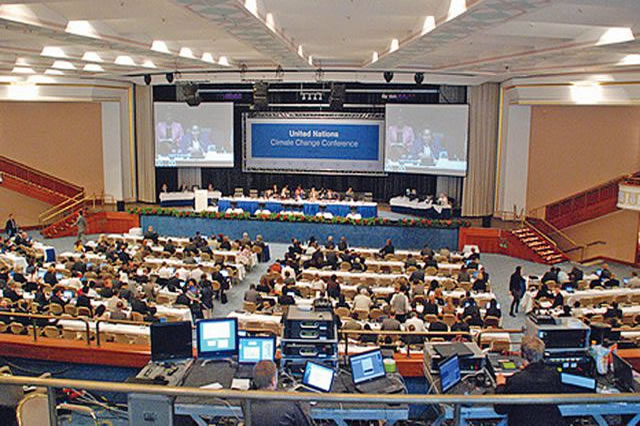In advance of the United Nations Climate Change Summit 2011 taking place in Durban later this year, the latest round of UN climate talks took place in Bonn from 6-17 June 2011.
In advance of the United Nations Climate Change Summit 2011 taking place in Durban later this year, the latest round of UN climate talks took place in Bonn from 6-17 June 2011.
Dr Tara Shine reports on a Foundation co-hosted event that took place in Bonn:
Dr Tara Shine Blog from Bonn:
“Women and Climate Finance – Past Experiences Inspiring Future Funds”
Several organisations came together to hold a side event at the UNFCCC Bonn intercessional looking at the gender dimensions of climate finance. The co-sponsors of the event entitled ‘Women and Climate Finance – Past Experiences Inspiring Future Funds’ were the Foundation, Global Gender and Climate Alliance (GGCA), Women’s Environment & Development Organisation (WEDO), the Government of Finland, IUCN, Oxfam, UNDP and UNEP.
Our time slot was in the evening on Monday the 13 June from 8 to 9.30pm and despite the late hour, we had very good attendance and active participation. Many thanks to all who came, stayed and contributed!
The objective of the event was to discuss lessons learned from experience to date in mainstreaming gender into climate funds and mechanisms and to reflect on how this experience can be used to best effect in the future, with a particular focus on the new Green Climate Fund.
The side event was moderated by Mary Robinson and split into 3 sections:
- gender and the clean development mechanism;
- progress on gender mainstreaming in existing climate funds; and
- gender and the Green Climate Fund.
There were presentations by people working to advance the gender dimensions of funding mechanisms and responses from members of the boards of the represented funds. This resulted in lively and interactive debate with good participation from the audience.
The key messages I took with me from the event are, that there has been progress on addressing gender within climate funds and mechanisms but this is work which needs to be continued and strengthened; there is real potential to make climate finance more effective by improving the gender dimensions of its governance, design, delivery and implementation; and finally there is a real opportunity to learn from experiences to date and make any future funds gender responsive from the outset.
Research presented by the Karoliina Attonen from the Government of Finland demonstrated real opportunities to create gender benefits through the Clean Development Mechanism (CDM) – this potential could be harnessed more effectively improve overall gender impact of CDM projects. The importance of reducing transaction costs for smaller projects and the lack of gender balance on the CDM executive board was pointed out as a barrier to more effective gender mainstreaming by Martin Hession, Chair of the CDM Executive Board.
Existing climate funds (LDCF, SCCF, Adaptation Fund and CIFs) have undertaken measures to mainstream gender resulting in some positive outcomes, for example in preparing National Adaptation Plans of Action (NAPA) and in identifying priority adaptation projects in the agriculture and water sectors with benefits for women and men. However this is work that needs to continue (perseverance was called for!) and would benefit from a more systematic approach. Five key steps which were suggested by Veerle Vandeweerd of UNDP which could facilitate this:
- Generate gender disaggregated data
- Carry out gender analysis at moment you establish a fund
- Ensure the active participation of women and gender experts in fund governance and management
- Gender must be considered in the design of all projects and programmes from the outset
- Support for gender mainstreaming at national level in developing countries.
There were positive inputs from the respondents representing the various funds – Boni Biagini from the GEF, Annette Windmeisser, a member of the CIF Trust fund Committee and Richard Muyungi, a member of the Adaptation Fund Board. All three demonstrated a personal commitment to gender mainstreaming and a desire to continue to champion the issue.
The final speaker, Cate Owren from WEDO put all this past experience in context by emphasising the opportunity presented by the new Green Climate Fund to address gender considerations from the outset and to be the first gender responsive, reactive and progressive climate fund. She also highlighted progress in including gender in decision texts of the UNFCCC – but stressed that text alone will not bring about real change, it also has to be made operational.
Mary Robinson closed saying that the Green Climate Fund must be and can be ‘different’ by addressing gender from the outset and that there are real opportunities to make it fully gender aware. She stressed that the lessons learned and shared at the side event must be brought to the attention of women leaders who can raise awareness at a political level and ensure that gender is factored in at every stage and at every level of decision making.
Related:


